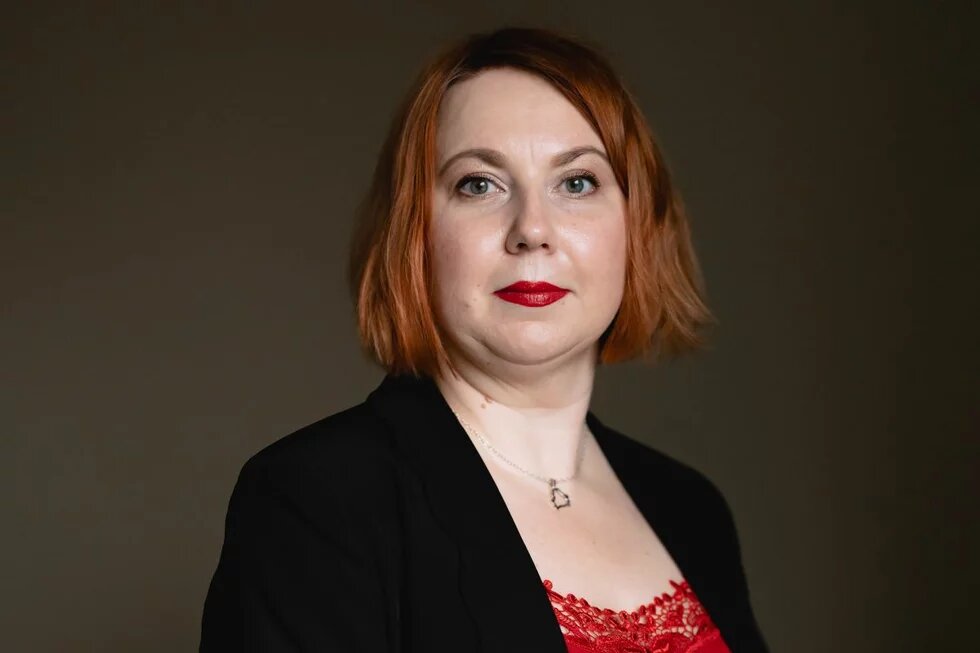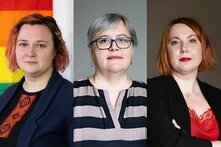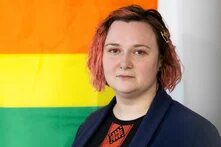Julia Mickiewicz switched from journalism to politics and then to NGOs. She is the co-founder of the feminist organisation FemGroup Belarus. Today, she lives in exile – still she continues in her unwavering struggle for gender equality, diversity, and social justice.

In the course of our conversation I’m jokingly asked whether, at some future point, I’d like to become Julia’s biographer. In her career she has been a part of many circles and could tell numerous “backstage” stories about Belarus’ democracy movement. Today, however, we’re just doing a brief interview, still, it is hard to miss – this woman is a force, she is driven, tenacious, and happy.
The path to setting up your own feminist organisation
Julia moved from the Belarusian town of Novopolotsk to Minsk in order to study journalism. Her mother wasn’t in favour of this. Julia’s from a working class family of modest means. “Back then, they told me,” she says, “why would you try this, if there’s only two ways you can get accepted – either by being strong-willed or by being very smart; and you are neither.” Julia disagreed, and she decided to prove to herself and to her family that she’s able to achieve her goals. She hasn’t looked back – and the disappointments she has had at the beginning of her journey have made her only more driven.
In Minsk, Julia fell in with the gay community. There, she made some close friends and even helped them set up an activist organisation. This, however, didn’t last long, as everybody was busy getting along with their own lives. “My lesbian friend told me,” says Julia, “that I was lucky to get into the gay crowd because, at the time, the lesbian community would not have embraced me, as I wasn’t a part of it. However, all my gay friends knew that I was straight, and I didn’t try to hide it.”
At the time, the lesbian community was not very open for allies, while gays were ready to work with anybody who would support them in building an inclusive agenda. Together with well-known Belarusian activists Slava Bortnik, Eduard Tarletsky, Alexander Poluyan, and others, Julia put on events and took part in debates. These experiences with gay activism opened a door for Julia and made her reflect on feminism.
At the school for journalism, Julia took a course on gender in the media and thus discovered her interest in gender issues. The school, however, didn’t offer any further such courses. Julia’s teacher, Natalia Kulinka, had some advise however, pointing her to the European Humanities University, EHU (editor’s note: The EHU is a private, non-profit liberal arts university. Founded in Minsk in 1992, it was closed down by the Belarusian authorities in 2004, after which it relocated to Vilnius, Lithuania). The EHU, she learned, offered a master’s programme in gender studies, and thus, in 2005, Julia Mickiewicz became one of the first students to enrol in this course. There, the things she learned from teachers such as Olga Shparaga, Olga Gapova, and other intellectuals, as well as from debates with her fellow students, helped Julia to develop her own mode of critical thinking and her feminist point of view, something she was later able to apply to journalism and activism.
The trouble of working with male teams
In 2007, Julia got a job with BelaPAN, Belarus’ largest non-governmental news agency (editor’s note: After the 2020 protests BelaPAN was closed down by the authorities. In 2023 it reopened under a new name as Pozirk). Here, Julia tried to address gender and LGBTQ+ issues, something that many of her colleagues frowned at.
Julia remembers one instance of workplace sexism especially well. One of her male colleagues put a dirty cup in the sink and asked Julia to wash it up because “women are better at that kind of thing.” Julia remained unfazed and replied that, as a matter of fact she was in the habit of using her hands to do the dishes, not her genitals, and therefore was quite confident her colleague would be able to do the job himself adequately. Surprisingly, the two became friends afterwards, supporting one another for many years professionally and in private. Besides incidences of sexism, Julia, however, remembers many occasions when male editors would support and encourage her and put trust in her work.
For many years, Julia was an active member of the youth section of the Belarusian social-democratic party Hramada, even leading it for a period. She describes how male-dominated and patriarchal the party was, and at one convention a man shouted at her: “You slut – what can you tell us? We are men with political experience – so what can you tell us?” Unsurprisingly, Julia’s memories of those times are not very fond.
I’m only responsible for things that are within my power
Despite all difficulties, Julia continues to be politically active, especially when it comes to gender equality. Frequently such work is unpaid and tough but Julia persists, as she very much wants to promote women’s issues politically. In 2024, she and her colleagues proposed a women’s quota of 40% for the elections to the Coordination Council, which, despite strong opposition, was finally accepted (editor’s note: The Coordination Council was created by Sviatlana Tsikhanouskaya in order to facilitate democratic change in Belarus).
Recently, Julia took over the position of first deputy for social issues in the United Transitional Cabinet of Belarus from Olga Zazulinskaya (editor’s note: this is a Belarusian government in exile, founded in 2022). This wasn’t an easy decision but, after considering it for a while, she accepted – under one self-imposed condition: “If I don’t make it, it won’t be the story of my defeat but due to the fact that I’m only responsible for things that are within my power.”
Many politicians reject gender quotas outright
She takes fully on board that her present mental state and workload won’t allow her to fully focus on the new role and achieve the results she desires. Should it prove to be too much she’s quite willing to cede the role. Team work matters a lot to Julia – she’s no lone warrior and hopes that other women will support and encourage her.
She regards campaigning for the rights and interests of women as a struggle. “Take the gender quota we fought for. For many politicians this is unacceptable and they reject gender quotas outright. So they’re trying to put pressure on us and come up with all kinds of explanations why this isn’t going to be feasible.” Depending on the situation, she will enjoy such debates, or find them frustrating, or hope for support from others. For 20 years, Julia has encountered the same kind of arguments, first in journalism, then in politics. Still, she will persist.
Where to draw strength
Julia says that her ideas about the feminist community and sisterhood are often idealistic, while the vibes within the sector itself are sometimes “frustrating and not always friendly.” Her familiarity with political activism has taught her not to take to heart all the envy, gossip, and rivalry. The support she receives, says Julia, comes mostly from those closest to her, especially from her husband.
For close to five years, Julia and her husband have been forced to live in different countries. Their relationship, she says, has never been marred by competition, and they have always supported and invigorated one another. For this, their shared sense of humour is also very important, and Julia says the two of them will even laugh when having sex.
Training your inner feminist eye
For Julia, like for her colleague Irina Alkhovka, it matters a lot to appreciate small changes for the better. In this regard she has trained her “inner feminist eye.” She explains: “There are results you can’t perceive immediately – and it may take 50 years for this to happen. Still, if I know that it was me who was behind it – even if it’s only a small thing – this will encourage me.”
To her it is important to practise feminism in everyday life – and not just in serious political contexts. She likes the idea of micro-feminism, and she doesn’t think twice whether to hold the door for a man or shake his hand first. “It’s a small step,” she says, “still, it matters.”
Julia likes Swedish culture and has learned the language. She has adapted the “lagom” approach, a term meaning “sufficient” or “just right.” It matters to keep an equilibrium between work and private life. Whenever she gets a sense that her battery is running low, she drops work and relaxes. Her favourite pastimes are reading books, watching TV (especially Swedish detective series), going for walks, and listening to music. Certain routines also help her keep going. “I think,” she says, “rituals matter a lot. They give you a feeling of stability, poise, and new ideas.”
Julia is curious and hungry for knowledge. Her interests are not limited to one area, and she likes to go outside her comfort zone because she believes that true change lies beyond the customary. She made a conscious decision not to have children, as this gives her the freedom and flexibility to do what she does – and the way she likes to do it. She likes her lips coloured red and her nails coral, and she’s not afraid to talk about good sex or show photos of her holiday by the sea. You will always encounter obstacles, she says, but I won’t let anybody take away my right to be happy.


